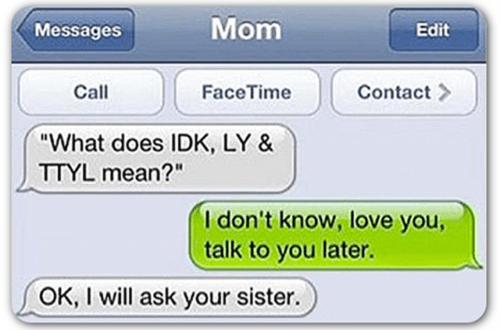-
2-minute read
-
6th March 2020
What Is Textspeak? And Can You Use It in Writing?
If you’ve ever stared at a text message and been confused by a string of BTWs, WTFs, FYIs, G2Gs and other combinations of consonants and numbers, you were probably dealing with textspeak. But what is textspeak? Where did it come from? And can you use it in your own writing?
What Is Textspeak?
Textspeak – also known as SMS language – is a form of slang that uses abbreviations. It is associated with text messaging, emails, and social media.
Modern textspeak developed out of necessity, as early mobile phones limited users to 160 characters in SMS messages. It was also quicker to write messages with abbreviations. Common forms of textspeak include character replacements, shortened words, and initialisms:
- Character replacements use a single character to replace multiple letters (e.g. ‘l8r’ instead of ‘later’) or use single letters in place of whole words with a similar sound (e.g. ‘2’ for ‘to’ or ‘U’ for ‘you’) .
- Shortened words remove letters (e.g. ‘txtspk’ instead of ‘textspeak’).
- Initialisms shorten whole phrases (e.g. ‘LOL’ for ‘Laughing Out Loud’).
And while textspeak was popularised by mobile phones and the internet, it isn’t new! When the OED added ‘OMG’ – short for ‘Oh my God!’ – to its lexicon, they cited the first use as being in a personal letter from 1917. So people have been informally shortening words for quite some time!
Find this useful?
Subscribe to our newsletter and get writing tips from our editors straight to your inbox.
Subscribe to Beyond the Margins and get your monthly fix of editorial strategy, workflow tips, and real-world examples from content leaders.
Can You Use ‘Txtspk’ in Your Writing?
Finally, can you use SMS language in your writing? Or is it just bad English?
If you’re talking about text messages, emails, and other personal communications, then go ahead! As long as the person you’re messaging can understand what you mean, you’re welcome to abbreviate any words you like (or ‘uw 2 abrevi8 ne words u lyk’, if you prefer).

(Image: Atib13/wikimedia)
Advertisers and creative writers may also SMS language to create a sense of informality or to mirror how people communicate in real life. But in formal writing, such as a university essay or a business plan, you should avoid textspeak! It would be too informal for documents like these, as well as making it harder to express complex ideas clearly.